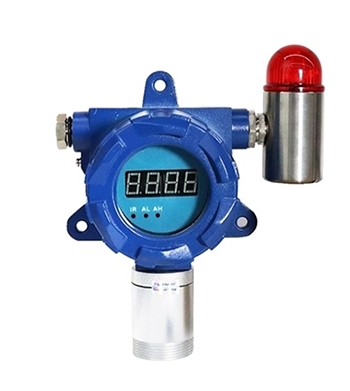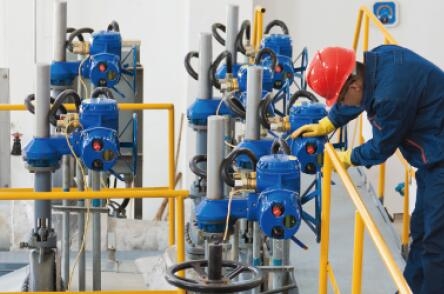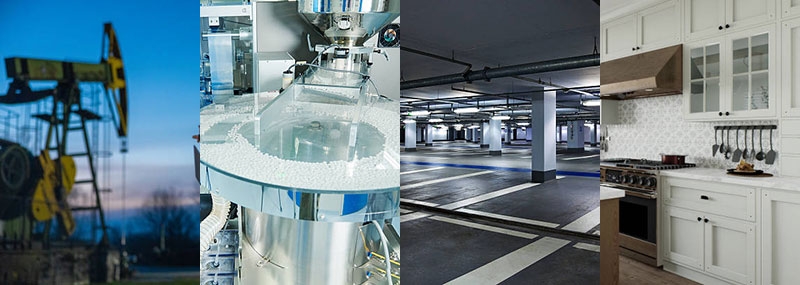Fixed Gas Monitor
Fixed Ammonia (NH3) Gas Monitor, 0 to 200/500/1000 ppm
Fixed Carbon Monoxide (CO) Gas Tester, 0 to 500/1000/2000 ppm
Fixed Chlorine (CL2) Gas Monitor, 0 to 10/20/50/100 ppm
Fixed Combustible Gas Monitor, 0 to 100%LEL
Fixed Hydrogen (H2) Gas Tester, 0 to 2000/5000/9999 ppm
Fixed Hydrogen Cyanide (HCN) Gas Monitor, 0 to 10/50/100 ppm
Fixed Hydrogen Sulfide (H2S) Gas Monitor, 0 to 20/50/100/200 ppm
Fixed Methane (CH4) Gas Monitor, 0 to 50% VOL
Fixed Nitrogen (N2) Gas Tester, 0 to 100% VOL
Fixed Nitrogen Dioxide (NO2) Gas Tester, 0 to 20/50/100 ppm
Fixed Oxygen (O2) Gas Monitor, 0 to 25% VOL, 0-30% VOL
Fixed Ozone (O3) Gas Monitor, 0 to 1/20/100 ppm
In modern industry, gas leakage is a safety issue that requires a high degree of vigilance. Whether in the petrochemical, metallurgical, pharmaceutical, or food processing industries, leakage of hazardous gases can lead to serious safety accidents, threatening the lives of employees and the property safety of enterprises. For this reason, fixed gas detectors have emerged as a key piece of equipment to safeguard the working environment. These detectors are capable of continuously monitoring the concentration of harmful gases in the air and will sound an alarm as soon as a gas leak is detected, helping companies take timely countermeasures to prevent accidents from occurring.
How Fixed Gas Monitors Work
At the heart of a fixed gas detector are the sensors that detect the concentration of a particular gas. Depending on the type of gas and detection requirements, common gas detection sensors include electrochemical sensors, catalytic combustion sensors, infrared sensors, and semiconductor sensors.

- Electrochemical Sensors: Usually used to detect toxic gases such as carbon monoxide and hydrogen sulfide. The working principle is to generate an electric current through an electrochemical reaction, the size of the current is proportional to the gas concentration, to achieve the measurement of gas concentration.
- Catalytic Combustion Sensor: It is mainly used for detecting combustible gases, such as methane and ethane. This kind of sensor uses a catalyst to oxidize with combustible gases under heating conditions, the heat generated causes changes in the internal resistance of the sensor, which in turn determines the gas concentration.
- Infrared Sensor: Widely used for detecting carbon dioxide and hydrocarbon gases. It determines the gas concentration by measuring the degree of absorption of infrared light at a specific wavelength.
- Semiconductor Sensor: Utilising the conductivity of the semiconductor material which varies with the gas concentration, it is suitable for detecting a wide range of gases, including alcohol, hydrogen, and ammonia.
Main Functions of Fixed Gas Monitors
Fixed gas detectors are designed to provide continuous gas monitoring and instant alarm functionality to ensure emergency response at the early stages of a gas leak. Its key features include:
- Real-time Monitor: The device is capable of monitoring the gas concentration in a designated area 24 hours a day, providing an immediate alarm should the preset safety threshold be exceeded.
- Multi-point Monitoring: By connecting multiple sensors, the fixed gas detector can monitor the gas concentration in multiple locations simultaneously, suitable for covering large areas.
- Alarm System: Equipped with an audible and visual alarm device, the alarm will emit a strong audible and visual signal when the gas concentration exceeds the limit, reminding staff to take immediate action.
- Data Logging and Transmission: Many modern gas detectors are equipped with a data logging function that can store historical detection data and transmit the data to a central control system via the internet or other means of communication for easy remote monitoring and analysis.
- System Integration: Fixed gas testers can be integrated with other safety equipment, such as automatic ventilation systems, fire alarm systems, etc., to achieve more comprehensive safety protection.

Wide Application of Fixed Gas Detector
Fixed gas detectors are widely used in a variety of places where long-term monitoring of air quality is required. In the petrochemical industry, gas leakage not only causes economic losses but also may lead to serious accidents such as explosions, so fixed gas detectors are standard equipment in almost every chemical plant. They are installed in areas where gas leaks may occur, such as storage tank areas, production workshops, and along gas pipelines, to monitor gas concentrations in real-time and ensure production safety.
Gas detection is equally important in the pharmaceutical and food processing industries. These industries often involve the use or generation of hazardous gases, such as ammonia and sulfur dioxide, which, if leaked, can not only pose a threat to the health of employees but can also contaminate products. Therefore, installing fixed gas detectors for continuous monitoring can effectively prevent the accumulation of harmful gases and ensure that the production environment meets safety and hygiene standards.
Public facilities such as underground garages, shopping malls, and airports are also important application areas for gas detectors. Carbon monoxide in garages and carbon dioxide in shopping malls are commonly monitored. Fixed gas detectors can monitor the air quality in these places in real-time to prevent the accumulation of harmful gases and provide a safe environment for the public. In addition, it is equally important to install fixed gas detectors in homes, especially in kitchens and garages where natural gas is used. It can alert you in case of gas leakage and prevent poisoning or explosion accidents caused by gas leakage.

Key Factors in Selecting a Fixed Gas Tester
When choosing a stationary gas detector, there are several factors to consider to ensure that it can be adapted to the specific environment in which it will be used and that it will work effectively. Firstly, it is important to choose the right type of sensor for the type of gas to be detected. For different industries and application scenarios, choosing the right detection instrument is crucial. For example, in the petrochemical industry, selecting a detector with a catalytic combustion sensor can effectively monitor the concentration of combustible gases, while electrochemical sensors should be prioritized for venues where toxic gases need to be monitored.
Secondly, the sensitivity and response time of the detector are two important technical indicators. A highly sensitive detector can capture very small amounts of harmful gases, thus giving an alarm at the very beginning of the problem and avoiding accidents. Response time has a direct impact on the efficiency of accident prevention. A fast response time enables timely action to be taken to minimize the damage caused by accidents.
In addition, environmental factors such as temperature, humidity, and air pressure will also affect the performance of the detector. When selecting, it should be ensured that the detector can work properly under the expected environmental conditions. In addition, the installation location of the device is also crucial. A reasonable installation location will ensure that the detector can effectively monitor the gas leakage point.
Modern fixed gas detectors are also intelligent and networked. For example, some high-end detectors can transmit data in real-time through the network, allowing users to remotely monitor gas concentrations and set alarm parameters via mobile phones or computers. Such intelligent features improve the convenience and efficiency of detection.
Fixed gas monitors play a crucial role in safeguarding environmental safety. Whether in industrial production, public facilities, or home environments, timely monitoring of gas concentrations and prevention of gas leakage accidents are key to ensuring the safety of people and property. When choosing and using fixed gas detectors, understanding their working principles, application scenarios, and maintenance methods can help us to better perform their roles and ensure that they provide reliable protection at critical moments.
As a premium supplier of high-quality gas detectors, Tool.com is committed to delivering superior safety solutions across a wide range of industries. Whether you need to install a large detection device at an industrial site or add an extra layer of security to your home, Tool.com has a high-quality product that meets your needs. By choosing the right fixed gas detector, you can effectively guard against the risk of gas leaks and safeguard your safety and health.













